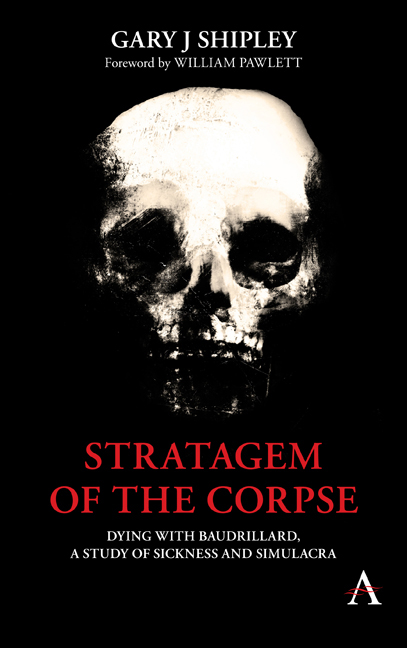Book contents
- Frontmatter
- Dedication
- Contents
- Acknowledgements
- Foreword by Pawletts William
- Introduction
- Chapter 1 On Decay and Other Synthetics
- Chapter 2 Stratagem of the Corpse
- Chapter 3 A Bleak Non-History of History
- Chapter 4 The Hyperactivity of Objects
- Chapter 5 The Unnamable Catastrophe
- Chapter 6 A Cure for Vertigo
- Chapter 7 Chance and the Temporality of Death
- Chapter 8 The Possibility of Nihilism
- Chapter 9 Smell-O-Vision: The Murder Show
- Chapter 10 The Evil Death
- Chapter 11 False Confessions and the Madness of Death: Making Death Speak
- Chapter 12 Black Light: Nigredo and Catastrophe
- Appendix 1 Whiteout: Spatiotemporal Interstices, Necropresence and the Immortality of Now
- Appendix 2 Pure Dreaming: Radicalized and Vermiculated Thought, or Death as an Earworm
- Appendix 3 The Non-Existence of the Scream
- Index
Chapter 6 - A Cure for Vertigo
Published online by Cambridge University Press: 20 February 2020
- Frontmatter
- Dedication
- Contents
- Acknowledgements
- Foreword by Pawletts William
- Introduction
- Chapter 1 On Decay and Other Synthetics
- Chapter 2 Stratagem of the Corpse
- Chapter 3 A Bleak Non-History of History
- Chapter 4 The Hyperactivity of Objects
- Chapter 5 The Unnamable Catastrophe
- Chapter 6 A Cure for Vertigo
- Chapter 7 Chance and the Temporality of Death
- Chapter 8 The Possibility of Nihilism
- Chapter 9 Smell-O-Vision: The Murder Show
- Chapter 10 The Evil Death
- Chapter 11 False Confessions and the Madness of Death: Making Death Speak
- Chapter 12 Black Light: Nigredo and Catastrophe
- Appendix 1 Whiteout: Spatiotemporal Interstices, Necropresence and the Immortality of Now
- Appendix 2 Pure Dreaming: Radicalized and Vermiculated Thought, or Death as an Earworm
- Appendix 3 The Non-Existence of the Scream
- Index
Summary
Morality is a simulation of what cannot be assimilated. Humanity cannot absorb any of its notions of the good, so it blows them up instead: an end game. For ‘there is no longer any such thing as a strategy of Good against Evil, there is only the pitting of Evil against Evil – a strategy of last resort’. And what are lesser evils but a means to medicate our dizziness? The explosion is the picture of where we are, just as decapitation is the picture of where we were, or where we imagine we’ve come from. And ‘the objectivity of the facts does not put an end to this vertigo of interpretation’, quite the opposite: it offers vertigo as a cure for itself. The only way to forget you are spiralling is to never stop spiralling, to accept spiralling as the necessary removal of what was never there in the first place. The imposition of stillness and concrete placement, of one at a time, of this follows that, of the arbitrariness of any solid arrangement whatsoever: all revealed as a security that only made you vulnerable. The truth is the already exploded bomb, not the promise of a bomb, and not the decapitated human figure. The latter's barbaric removal of thought (of thought deemed threatening) is a wet fuse in comparison with the exploded state of humanity's unseatedness. Decapitation is merely antiirony and so cannot be other than simulation: its simulated seriousness is just the seriousness of its simulating. For how are we supposed to take seriously the removal (in beheading) of what is already smeared across the earth and the universe in increasingly fragmented droplets of disorientation and quintessential non-belonging – the lostness of our waking from linearity and fixedness? Beheading is the ultimate anachronism. Beheading is the reinforcement of the perpetrator's own disintegrated ownership of himself: as Dr Faustroll tells us: ‘I maintain that a head is only a head when separated from its body.’ If we zoom in the effects are horrific, but as we pan out all we see are children killing effigies of themselves. To become a bomb, on the other hand, is to enact and to enable the latent scream of existing unhumanly amid false memories of the imagined lives of the dead, of a once paused state of humanity enshrined as mythology, as religion, as the heart of an explosion that itself does not explode.
- Type
- Chapter
- Information
- Stratagem of the CorpseDying with Baudrillard, a Study of Sickness and Simulacra, pp. 75 - 90Publisher: Anthem PressPrint publication year: 2020



